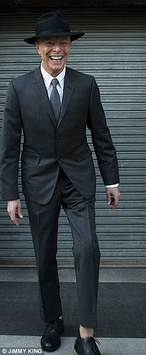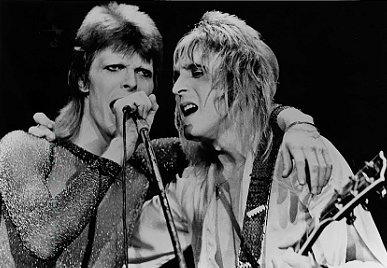
by Erik Ritland
When I originally typed out the title to this article I shook my head. A tribute to David Bowie? What? It didn't make any sense.
Sure, I didn't know David Bowie, but he still meant a lot to me. His creativity, and what he created, is at the foundation of so many emotional places in my life. It is even at the foundation of why I create anything at all, be it music, writing, or whatever else. I’ve significantly bonded with many of my friends over him and his music. It's hard to think of any other musician that means as much to those I know as David Bowie does.
 One of the last pictures of Bowie. Photo by Jimmy King. Used under Fair Use Agreement.
One of the last pictures of Bowie. Photo by Jimmy King. Used under Fair Use Agreement. His roots were as a rhythm and blues artist. Even his first single, energetic jump blues “Liza Jane,” has a passion that foreshadowed all the changes he went through in his career (pardon the pun). As a kid, I spent far too many hours listening to his earliest material over and over. The fun, unpredictable, baroque 60s pop of his self-titled debut album is decidedly underrated. For a primer, check out “The London Boys” and “Karma Man,” two of my favorite Bowie songs.
Bowie followed the Dylan influenced Space Oddity with his first truly original album, the beautifully murky proto-metal of The Man Who Sold the World. The erratic, breathtaking guitar work of Mick Ronson, along with the visceral rhythm section of Woody Woodmansey and Tony Visconti, created instrumentally and atmospherically heavy rock n' roll that was ahead of its time. The album surpasses even Sabbath and Zeppelin in its power and immediacy. Opening suite “The Width of a Circle” is one of Bowie's darkest, most creative, most sexually charged songs. “All the Madmen” follows, a powerful psychological exploration of insanity with a fittingly intense backing of heavy guitars and otherworldly synths. "The Man Who Sold the World" is one of his strangest, most compelling songs. Its layers of keyboards, percussion, and multi-tracked vocals are truly scary.
As he often did, Bowie followed up the heavy Man Who Sold The World with something completely different. Hunky Dory is one of the best songwriting albums of all-time, so you’re missing out if the only song you know from it is “Changes.” “Quicksand” is certainly the only profoundly philosophical (and even borderline Satanic) song with a singalong chorus. Melodic Beatle-esque “Life on Mars” is as important to the Bowie persona as “Space Oddity.” The weird folk of “The Bewlay Brothers,” like “All the Madmen” before it, is an emotional ode to his schizophrenic half-brother Terry.
 David Bowie and Spiders from Mars guitarist Mick Ronson, two of my biggest heroes. Copyright unknown. Used under Fair Use Agreement.
David Bowie and Spiders from Mars guitarist Mick Ronson, two of my biggest heroes. Copyright unknown. Used under Fair Use Agreement. Follow up Aladdin Sane has a blues based, high energy, Rolling Stones feel and influence, but it is scarcely less powerful. It’s a tour de force, from wild “Watch that Man” to gorgeous “Lady Grinning Soul.”
Although this era was only Bowie’s initial breaking out, it is what impacted me the most. I love many of his other albums: the bleak, foreboding rock of Diamond Dogs; complex soul rock masterpiece Station to Station; powerful guitar driven Scary Monsters; unheralded ‘90s release …hours (only because it came out at the height of my Bowie obsession); and his last several albums. In a significant way nothing impacts a person more than the music they discovered when they were in their early teens, when life is crazy and everything carries extra meaning. This is when I discovered Bowie, and his music never lost that initial magic.
Although he has left this vale of tears, in significant ways David Bowie will never die. His music, his soul, and his spirit will live on forever. It is up to those who loved him to carry his spirit and legacy forward, not only by appreciating and loving what he created, but also by creating meaningful music and art in the same innovative spirit. I am thankful and grateful for the place he has in my life.
Erik Ritland is a writer and musician from St. Paul, Minnesota. His blog and podcast Rambling On features commentary on music, sports, culture, and more. He was also Lead Staff Writer for Minnesota culture blog Curious North. Support Erik's music via his Patreon account, reach him via email, or find him on Facebook and Twitter.
 RSS Feed
RSS Feed
